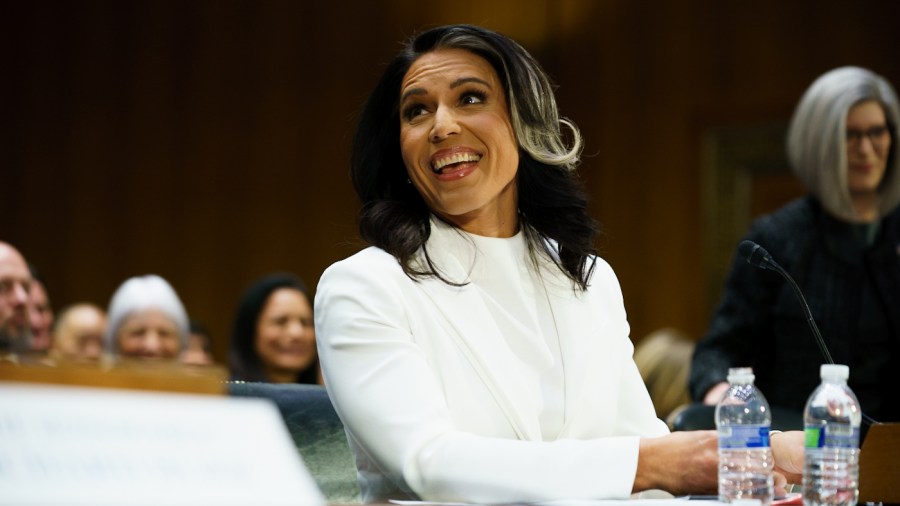
The Senate Intelligence Committee on Tuesday advanced Tulsi Gabbard’s nomination to become the next director of national intelligence (DNI), putting her in position to get confirmed by the full chamber after key senators threw their support behind her.
The 9-8 vote was along party lines. It puts Gabbard only days away from being considered on the Senate floor after a roller-coaster process.
The vote took place only hours after Sen. Todd Young (R-Ind.), a key GOP swing vote, announced that he would support her.
During Thursday’s confirmation hearing, the Indiana Republican was visibly frustrated after Gabbard refused to call Edward Snowden, the former contractor-turned-leaker who fled the U.S., a traitor on multiple occasions.
But on Tuesday Young said he secured a number of commitments from Gabbard regarding deterring Snowden-like whistleblowers, not pardoning Snowden and working to reauthorize Section 702 of the Foreign Intelligence Surveillance Act.
“I appreciate Tulsi Gabbard’s engagement with me on a variety of issues to ensure that our intelligence professionals will be supported and policymakers will receive unbiased information under her leadership,” Young posted on the social platform X alongside a letter Gabbard sent him of commitments in order to win his vote.
“I have done what the Framers envisioned for senators to do: use the consultative process to seek firm commitments, in this case commitments that will advance our national security, which is my top priority as a former Marine Corps intelligence officer,” he continued. “Having now secured these commitments, I will support Tulsi’s nomination and look forward to working with her to protect our national security.”
Gabbard had secured another big win on Monday as Sen. Susan Collins (R-Maine) said that she would back her in the committee vote.
Collins and Young had been seen as pivotal votes in committee, and winning over the pair likely also greases the skids for the former congresswoman on the Senate floor, where she can only afford to lose three Republicans. Sen. Mitch McConnell (R-Ky.) is considered a likely “no” vote, while Sen. John Curtis (R-Utah) indicated following the hearing that he had more “questions” about her confirmation.
From the moment Trump announced Gabbard as his nominee to be DNI, questions have cropped up about her past views and statements.
Those include her 2017 meeting with then-Syrian President Bashir al-Assad, which occurred as he was accused of using chemical weapons on his own people, as well as her stance on Russia given multiple comments she made about the war with Ukraine that were considered sympathetic to Moscow and were echoed on Russian state TV.
Gabbard also faced numerous questions over her past defense of Snowden.
A key moment during Gabbard’s hearing came when Sen. James Lankford (R-Okla.) asked whether she views Snowden as a “traitor,” advising her that members of the Intelligence panel would feel a lot better about her nomination if she would do so.
Instead, Gabbard sidestepped two questions about whether Snowden betrayed the nation, telling lawmakers she is “focused on the future and how we can prevent something like this from happening again,” referring to Snowden’s theft of secret documents.
Lankford said it should have been an “easy question” to say it’s “universally accepted when you steal a million pages of top-secret documents and you hand it to the Russians, that’s a traitorous act.”
Privately, Gabbard had sought to assuage senators about her views on Snowden, saying she didn’t feel he had the proper channels to blow the whistle.
The Gabbard move also comes about a week and a half after senators confirmed Defense Secretary Pete Hegseth, who lost three votes on the floor but got the greenlight thanks to a tie-breaking vote by Vice President Vance.











